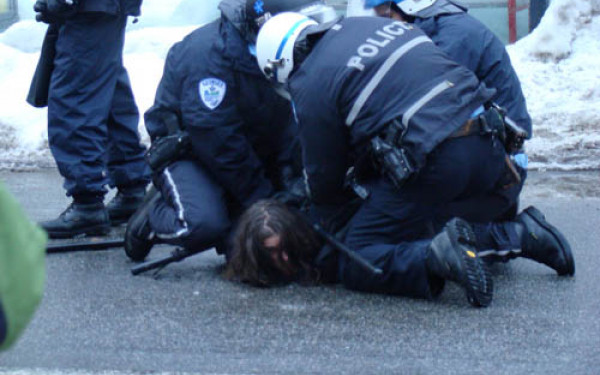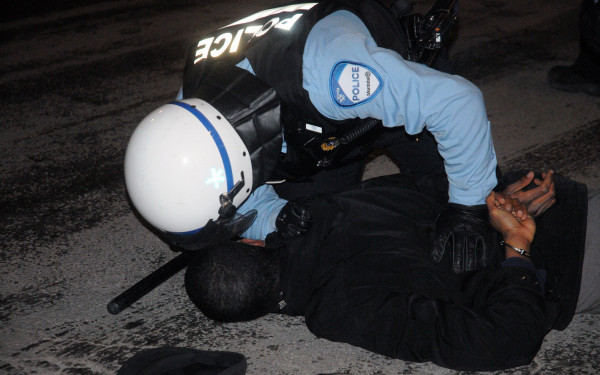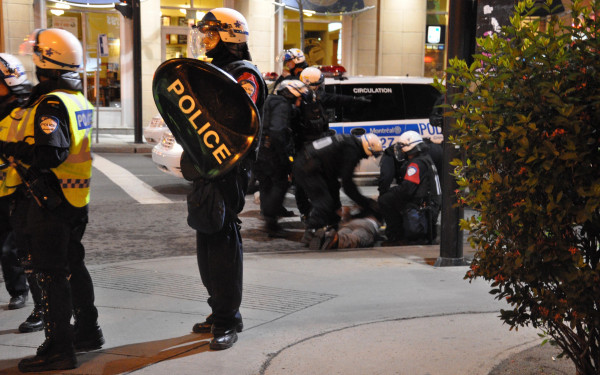Local Activist Wins Civil Suit Versus SPVM
Court Sides With Jaggi Singh on Unjust Arrest
A Quebec superior court judge has ordered two SPVM officers to pay $15,000 to well-known Montreal activist Jaggi Singh, following a nearly seven-year-long civil suit.
Judge Micheline Perrault found that the officers violated Singh’s rights during an arrest eight years ago, and that their actions should be “denounced and disapproved” by society.
This ruling stems from an incident on March 8, 2007 in which Singh—who works at the Quebec Public Interest Research Group at Concordia—was arrested during a protest marking International Women’s day in downtown Montreal.
At 6:30 p.m., approximately 50 people set off to march from Berri Square to Phillips Square. As they walked along Ste. Catherine St., officer Frédéric Mercier recognized Singh, and called in to a police station to see if the prominent activist was subject to any legal conditions. Mercier was advised that, due to a prior arrest, Singh was restricted from attending or participating in protests that were deemed non-peaceful.
Meanwhile, the march arrived at Phillips Square, where some speeches were made to the crowd. Once this was over, some of the protesters proceeded to march back towards Berri. As they neared their starting point, police on the scene asked the marchers to take the sidewalk.
With his court-ordered condition in mind, Singh decided to obey the directive, wanting to avoid any problems with police. However, with the authorization of Sgt. Georges Lamirande, officer Mercier arrested Singh as he was leaving the demonstration at 7:26 p.m., alleging that he had participated in a non-peaceful protest.
“We’re focused on the word ‘peaceful,’ and legally speaking, it was a peaceful demonstration—a festive, engaged demonstration,” Singh recalled in an interview with The Link. “The police used the fact that people were chanting anti-police slogans to argue that it was non-peaceable.”
Singh was taken away in a police cruiser, and spent the night in jail awaiting a court hearing the next morning. During the hearing, the Crown prosecutor objected to granting the activist bail, which the court upheld.
“As anyone who follows the court system knows, it’s very, very rare to be denied bail,” Singh said. “There are people who are accused of doing very serious things who are able to get bail—and yet I’m denied bail.”
Singh spent a total of five days and four nights in jail following the arrest, and was released on March 13. Throughout his imprisonment, he maintained that he was unjustly arrested given the peaceful nature of the protest.
On Feb. 28, 2008, nearly a year after the initial arrest, a Crown prosecutor offered to drop all the charges if Singh pleaded guilty to a lesser municipal offense. After Singh refused, the prosecutor, Paul Rouillard, told Singh’s lawyer, “OK, you called my bluff.”
Singh took exception to this statement, and felt that it showed misconduct on the part of the prosecutor. “You’re not supposed to talk about bluffing,” Singh said. “Either you have evidence or you don’t, and if you don’t, you drop the charges—you don’t try to leverage.”
Rouillard then presented Singh’s lawyer with a second offer: all charges would be dropped if Singh signed a letter stating that he would not pursue legal action against the arresting officer. The prosecutor was advised that Singh would agree, if the City of Montreal wrote him a letter of apology.
Before this agreement could be finalized, all charges were dropped that same day. Singh initiated his civil suit six months later. Seven years later, he finally won.
Highlights from Wednesday’s Ruling:
- Officer Mercier claimed that the International Women’s Day march was non-peaceful because protesters were walking against traffic, and some made hostile comments toward police.
- Mercier’s superior, Sergeant Lamirande, wrote a report of that day’s events, which failed to mention why the protest was deemed non-peaceful, or when that determination was made.
- The ruling found that the reasons stated by officer Mercier were insufficient to deem the protest non-peaceful. It also points out that police did not announce the march as being non-peaceful at the time, and no dispersal order was given over loudspeaker. Therefore, Singh had reason to believe he was participating in a peaceful protest.
- Crown prosecutor Paul Rouillard was also included in the civil suit, with Singh alleging that he had no reasonable motive to pursue charges until Feb. 2008. However, the court dismissed this “given the relative immunity of the Crown in the exercise of its functions.”
- The court determined that Mercier decided to arrest Singh the moment he saw him, and that declaring the protest non-peaceful was meant to legitimize the arrest after the fact.
- The ruling states that this was a violation of Singh’s rights under Section 7 of the Canadian Charter of Rights and Freedoms, which guarantees, “Everyone has the right to life, liberty, and security of the person, and the right not to be deprived thereof except in accordance with the principles of fundamental justice.”
- The $15,000 owed to Singh in exemplary damages, which are awarded to both punish the offenders and dissuade others from carrying out similar actions.
- While Singh sees the ruling as a positive development, he does not believe it will lead to any significant change. “I’m definitely not speaking in terms of vindications or victories,” Singh said. “It’s through political organizing, social mobilizing—actions in the streets—that we can defeat the activities of the police that we feel are unfair, or are examples of their impunity.”
- The City of Montreal has not yet announced whether it will appeal this ruling.
Video by Matt D’Amours






01web_600_375_90_s_c1.jpg)